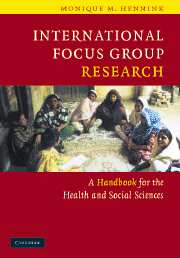Book contents
- Frontmatter
- Contents
- List of figures
- Preface
- Acknowledgements
- 1 Introduction to focus group research
- 2 Planning international focus group research
- 3 Preparing the discussion guide
- 4 Training the focus group team
- 5 Participant recruitment
- 6 Group composition
- 7 Number of groups and group size
- 8 Focus group location
- 9 Conducting the group discussion
- 10 Recording the focus group discussion
- 11 Data preparation and analysis
- 12 Reporting focus group research
- References
- Index
6 - Group composition
Published online by Cambridge University Press: 12 January 2010
- Frontmatter
- Contents
- List of figures
- Preface
- Acknowledgements
- 1 Introduction to focus group research
- 2 Planning international focus group research
- 3 Preparing the discussion guide
- 4 Training the focus group team
- 5 Participant recruitment
- 6 Group composition
- 7 Number of groups and group size
- 8 Focus group location
- 9 Conducting the group discussion
- 10 Recording the focus group discussion
- 11 Data preparation and analysis
- 12 Reporting focus group research
- References
- Index
Summary
Introduction
Group composition refers to the characteristics of participants in the group discussion, and how these characteristics may affect group cohesion and productive group discussion. The composition of individuals in a focus group discussion has a significant effect on the group dynamics and can therefore aid or inhibit productive discussion. Group interaction is vital in focus group research, therefore careful attention to the composition of the group is important (Bloor et al. 2001; Fern 2001). Good group composition will generate a productive discussion with useful data to meet the research objectives, while poor group composition may lead to little or irrelevant discussion or at worst conflict between participants.
There are two aspects of group composition which are likely to impact on the group dynamics: the level of acquaintance between participants and the level of homogeneity in participant characteristics. This chapter discusses how each of these issues influence the group discussion for research in both developed and developing country contexts. The key issues for consideration are highlighted as well as strategies to achieve the optimum group composition. It is important to highlight that there is no rigid formula for group composition, and the most effective group composition will differ by the research context and the type of study participants. The primary influence on group composition will be creating an environment which fosters an effective discussion, the components of which are likely to vary by the context of the research.
- Type
- Chapter
- Information
- International Focus Group ResearchA Handbook for the Health and Social Sciences, pp. 115 - 134Publisher: Cambridge University PressPrint publication year: 2007



